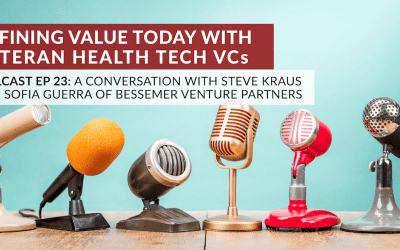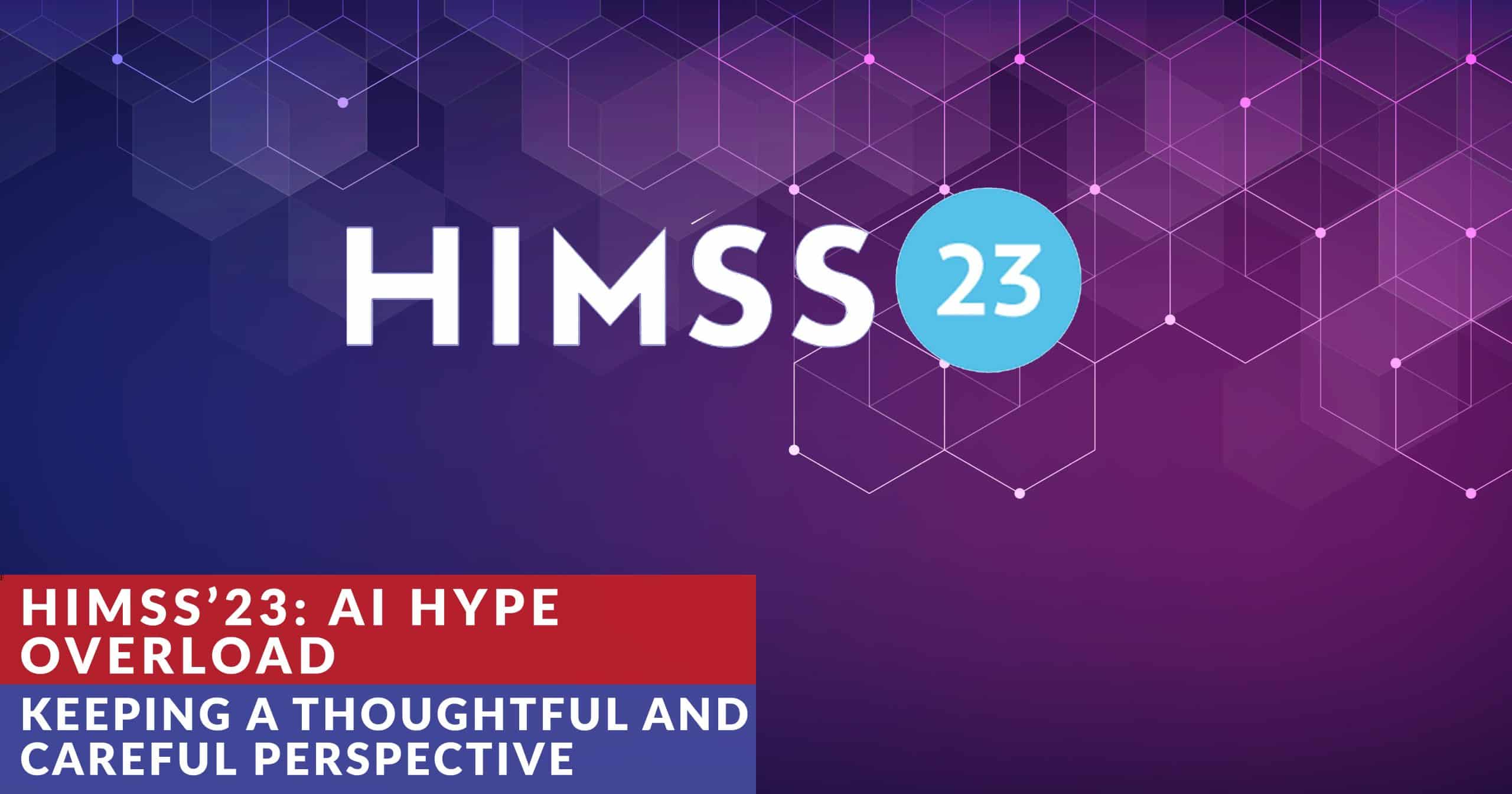
But despite all of these well meaning (and certainly many self-serving) efforts, I enter my hotel room tonight and sit-down to write this post feeling depressed.
The depression comes from a disconcerting feeling that all that I have seen in the last few days are clear examples of exactly what is wrong with healthcare and that the $20B+ that we, as a nation, are preparing to spend on HIT will make little difference and may actually make things worse.
Though a strong believer in the transformative power of HIT in healthcare, after sitting in on a number of sessions and having conducted briefings with over 20 vendors (yes, I’ve been extremely busy here), it is clear that the mindset of this industry and many of its self-promoting pundits, needs to hit the reset button (or better yet, go into retirement). We are not, as an industry, focusing on the right things. Rather than focusing on how to keep people out of the healthcare system, keep them from becoming patients, everything I have seen and heard here at HIMSS is about keeping people tied into the system. A sad and depressing state of affairs that if I think about it too much, makes me angry.
After spending the last several days at HIMSS, I am convinced that the only way we are going to move the needle in a positive direction is to begin handing over the reins to the consumer. For far too long this industry has kept the consumer in the dark and has not helped that consumer in directly managing their health. It has taken a paternalistic view that must end immediately. Nowhere at HIMSS did I see or hear people discuss the consumer (well, there was the occasional marketing education session on how to reach the consumer, but that is just marketing and doesn’t count). The only perspective on display at HIMSS is that of consumer as patient. Problem is, that view goes under the assumption that the only purpose of healthcare is to treat people that are already sick.
What about preventative health? What about the idea of keeping consumers out of the healthcare system? What is the roll of this industry in providing the tools and capabilities that will enable consumers and care providers to work more closely together for mutual benefit? Where are these discussions taking place? Where are these technologies on display? Well, they are certainly not here at HIMSS, or at least I couldn’t find them.
A Bright Ray of Sunshine

That bright ray of sunshine is what keeps me going. Having heard that story, and I am sure there are others out there. I am more convinced than ever that the role of Chilmark Research is to search out and find those innovators who are working to take healthcare in a completely new direction. This is why I started Chilmark Research – those stories need to be told, and we need solid analyst research to substantiate those claims and better understand the true adoption drivers. This is where Chilmark Research will devote the majority of its efforts and hope that you will assist us by providing those stories, those proof points, that will, in a broader context, move the needle in a positive direction.




Hey John, thanks for the gut level candor. Your intuitive guidance system is likely right on the money as to currents and cross currents in healthcare IT space. It’s hard to imagine anything but a HIMSS feeding frenzy under the circumstances, and incentives laid in front of a very anxious industry hungry for an ROI.
Fortunately, “IT” is now more than the conventional IT industry cast of characters. It now includes the growing legions of tech challenged, to marginally competent social media users, who by definition brush up against the tech component on the road to social media mastery; many of them with skin in the game of a health and wellness mission.
This growing body of atypical tech “peeps” may in part become a driving force that wrestles the decisions out of the sole discretionary domain of healthcare providers and IT special interest groups.
Indeed we do not have a healthcare industry per se; rather we populate and feed daily a sickness care system addicted to the operating cash flow generated by ill conceived payment incentives and the bloated administrative systems upon which it relies.
Yet, we are beyond the point of “diminishing returns” where a mere incremental tinkering (ie, a better EHR or EMR mousetrap) can rescue a failing and flawed paradigm that is imploding under the weight of it’s own illusory potential.
Keep up the good work! Your insights are appreciated and humanity is especially refreshing.
Great post! You know Dennis Quaid was a good representation of the consumer – his keynote was very “human.” HIMSS caught a lot of heat for having him use his celebrity status, even though he is a consumer, to advance the adoption and implementation of EHRs.
I somehow wonder if industry just does not yet have a mindset the the consumer is an integral player in health care generally, and health care reform, specifically!
Nice summary on where healthcare is and how the focus appears to be marketing and not education. I realize the 2 go together too, but where’s the balance here?
I like technology and what it can do as much as the next person but hopefully we are not at the point where we just simply through some devices and software at people and let them sink or swim.
I read somewhere on the web about unsolicited calls are being made by vendors to help explain the stimulus package as everyone is now an expert, but really wonder is anyone an expert including those who wrote the bill?
I have said it quite a bit on my blog as well and it seems we are losing the “human” in all of this today. Is it about better healthcare, or better systems? I think once more we have come back to one more imbalance.
You’re right to feel depressed, although I think a touch of outrage would be more fitting. Not just healthcare, but *every* industry has displayed a self-serving greed when it comes to stimulus spending. There’s been precious little introspection about what change stimulus spending can bring about.
I’m completely with you on the patient becoming the hope for future change. Educated patients are an incredible untapped resource, as long as we can come up with the etiquette and the channels for them contribute. I see great things coming out of the e-patient movement in this regard.
There are rays of sunshine, but many of them lie outside of the conventional healthcare establishment. The future lies in attracting talent from outside and putting them to work in ways that are unconventional, to the healthcare industry at least.
John, as I read your post, I was shaking my fist and shouting, “Yes!” [Actually I am sitting quietly at my desk, but I was doing that INSIDE.]
It’s frustrating that so many in the health system can’t take off their binary-equation goggles that only allow them to see people as “sick” or “not sick yet.” That’s just NOT how real people view health . . . and precious few are taking that into consideration.
More need to understand it and try to empower the inevitable (IMHO) health revolution.
Thanks for the post – and cheer up. Even if it’s bloody along the way, we’ll get there.
I am a strong proponent of giving consumers (I prefer patients) access to all of the data that we providers and health plans have and cool tools like you describe. I am less optimistic that this is the solution to radically improve the health of America. Our weight problem is not the result of a lack of knowledge about the perils of obesity.
John
Bang on! And i share that feeling after returning from the conference. And it was good to meet you and share ideas. And as i said, i really appreciate your candor and your efforts to search out the innovators who are trying to invert the thinking!
btw , i got that same picture – right across the wrigley building.
This note has nothing to do about you comments vis a vis HIMSS 09, so let me begin with apologies.
Instead, this week I spent at the CSHL ‘Genome Access’ course, the closed NIH meeting: “The Personal Human Genome’ and PMC’s meeting ‘2009 Personalized Medicine’ conference (PHEW!). Boy, talk about how real scientists view the SNP, GWAS and related data versus how Medco and the pharrm industry views how they are going to control of all personal genomics – it is an amazing discrepancy!
I have written internal reports on my thoughts on these meetings and such, and am willing to be share these with you John for free if sense any value in that.
Thanks- Gerry